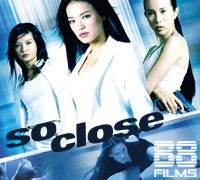Director: Takuji Kitamura
Writer: Tatsuhiko Takimoto, Hirotoshi Kobayashi
Cast: Megumi Seki, Hayato Ichihara, Yosuke Asari, Itsuji Itao, Haruma Miura, Maho Nonami, Hiromi Shinjo, Aya Kiguchi
Running Time: 109 min.
By HKFanatic
Don’t let the title fool you: “Negative Happy Chainsaw Edge” is not a film that would fit in with the Sushi Typhoon catalog. There’s no blood, no gore, no strangely appendaged women. The second coming of “Machine Gun Girl” this is not. At its heart, “Negative Happy” is a coming-of-age drama/comedy, with a few special effects-laden battles sprinkled in. There’s action for those who are seeking it, but the emphasis is firmly on the characters and their budding relationships.
The plot of “Chainsaw Edge” almost feels like two films grafted into one; if I have a serious knock against the movie, it’s that the two disparate plots never quite gel. On one hand, there’s the story of high school student Yosuke as he faces the pressures of growing up. He feels his life is pretty unremarkable and envies a friend who recently died in a motorcycle crash. Yosuke figures that if he could just go out in a blaze of glory like that, then his life might mean something. Yosuke finds his cause late one night when he runs into a girl his age, Eri, who routinely engages in battle with a giant chainsaw-wielding maniac. Even though he’s a self-described wuss, Yosuke decides to do what he can to protect Eri and if he dies in the process then, well, so much the better.
The scenes of Eri fighting a “Friday the 13th”-style villain often feel like they come from a different movie entirely and not the one you’re currently watching, with its detailed focus on Yosuke’s teen angst and his burgeoning affection for Eri herself. More often than not, the fights are abbreviated and director Tajuki Kitamura prefers to cut to their aftermath. Fortunately, the film is bolstered by some great performances that help one overlook the uneven tone. Hayato Ichihara stars as Yosuke. He played the lead in “All About Lily Chou-Chou,” one of my favorite films of all time, but a good seven years passed between the two movies so he’s virtually unrecognizable from “Chou-Chou.” His role in “Chainsaw” is the opposite of the tortured soul he played in that film: loud and expressive but still a slacker at heart.
Most of the humor in this film is generated from the relationship between Yosuke and his roommate, Watanabe. Watanabe is a slacker too; he can’t seem to commit to a single passion or hobby. He initially wanted to be a musician but his bandmate and friend, Noto, died in that bike accident. Next he tries his hand at photography and painting. Watanabe spends most of the film attempting to piece together a song that their late friend wrote. Since their friend is played by a real life pop star (Haruma Miura), the actor recorded vocals for the track and performs it during an extended music video sequence.
“Negative Happy Chainsaw Edge” is based on the novel by Tatsuhiko Takimoto, a popular young writer in Japan. Takimoto has admitted he is a recovering “hikikomori,” a Japanese term for people who are reclusive or shut-ins. That feeling of vague discontent, the sense that the life one is leading is mediocre at best, hovers over the story. Even the Chainsaw Man that Eri fights is merely a stand-in for the monster of grief. Eri is a normal girl who must become a strong warrior in order to face the tragedy of her past until she realizes she can’t go it alone.
For a low-budget Japanese film, “Negative Happy” has excellent special effects, with CG work that is better than some mainstream Hollywood pictures I’ve seen. The film has moments of great visual beauty, mostly during action sequences: the Chainsaw Man seems to plummet to earth from the moon above and Eri performs impossible, anime-esque leaps. A scene set in a large indoor pool is a sight to behold even if it doesn’t last very long. However, there are times during the many dialogue-driven scenes that the film, shot on hi-definition camera, looks unappealingly fuzzy.
“Negative Happy Chainsaw Edge” is quite unlike any Japanese movie I’ve seen. It has a style similar to Ryuhei Kitamura’s “Versus” but without the violent action that will please gorehounds. The story is bloodless but endearing; this movie, like its characters, tends to wear its heart on its sleeve. If you enjoyed character-driven but quirky Japanese flicks like “Drop” or “X-Cross,” you should give “Negative Happy” a watch. “Negative Happy Chainsaw Edge” is now streaming on Netflix Instant.
HKFanatic’s Rating: 7.5/10




